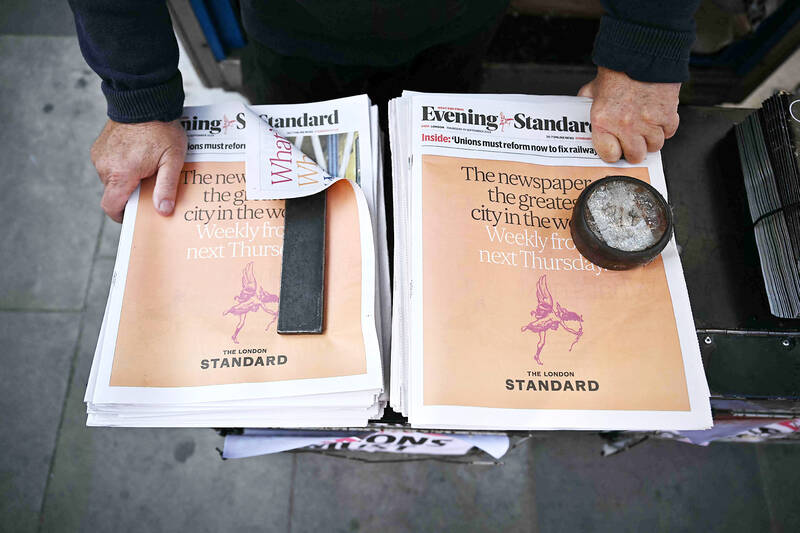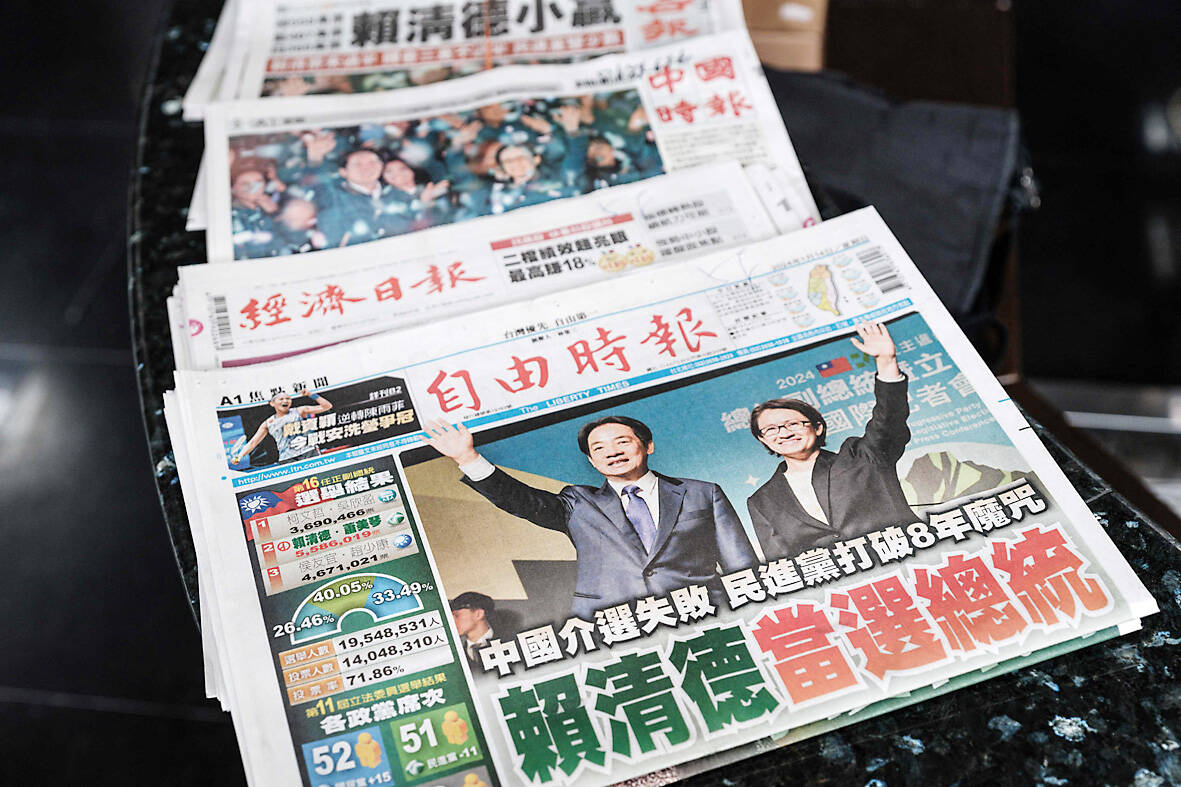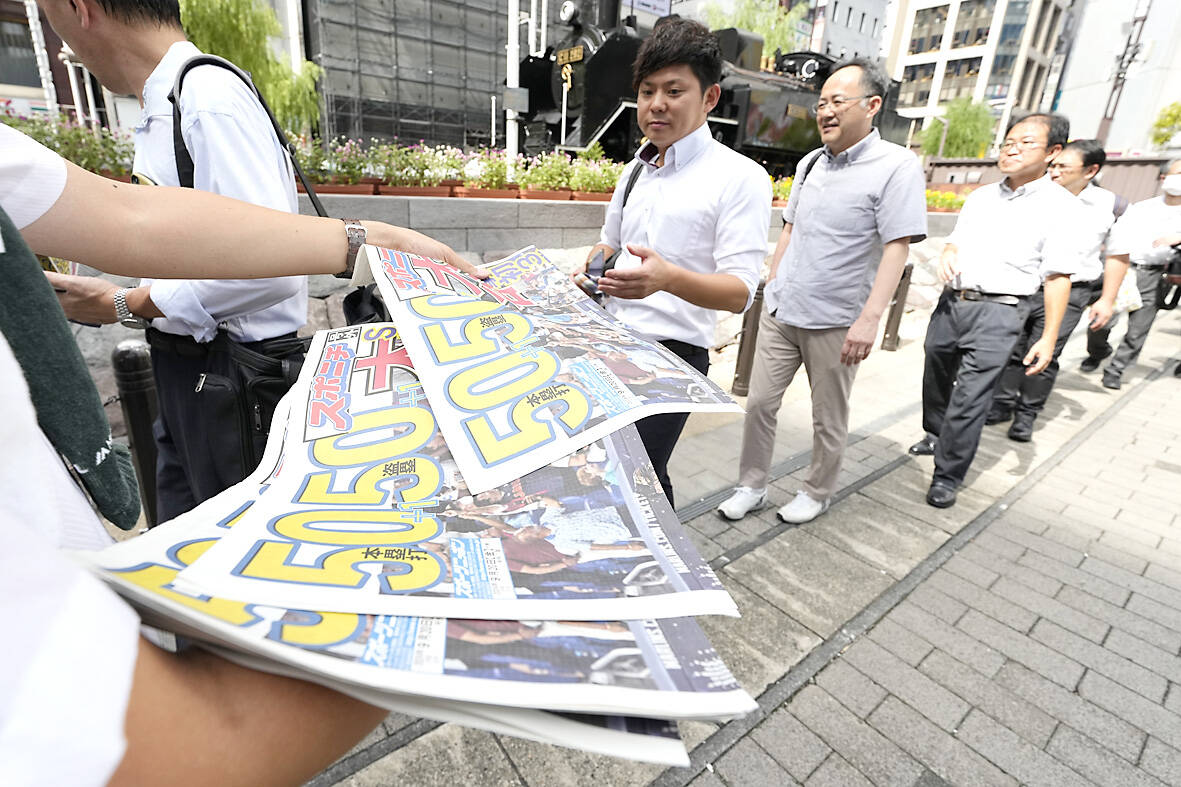From disinformation campaigns to soaring skepticism, plummeting trust and economic slumps, the global media landscape has been hit with blow after blow.
World News Day, taking place today with the support of hundreds of organizations, aims to raise awareness about the challenges endangering the hard-pressed industry.
‘BROKEN BUSINESS MODEL’

Photo: AFP
In 2022, UNESCO warned that “the business model of the news media is broken.”
Advertising revenue — the lifeline of news publications — has dried up in recent years, with Internet giants such as Google and Facebook owner Meta soaking up half of that spending, the report said.
Meta, Amazon and Google’s parent company Alphabet alone account for 44 percent of global ad spend, while only 25 percent goes to traditional media organizations, according to a study by the World Advertising Research Center.

Photo: AFP
Platforms like Facebook “are now explicitly deprioritizing news and political content,” the Reuters Institute’s 2024 Digital News Report pointed out.
Traffic from social to news sites has sharply declined as a result, causing a drop in revenue.
Few are keen to pay for news. Only 17 percent of people polled across 20 wealthy countries said they had online news subscriptions last year.

Photo: AP
Such trends, leading to rising costs, have resulted in “layoffs, closures and other cuts” in media organizations around the world, the study found.
ERODING TRUST
Public trust in the media has increasingly eroded in recent years. Only four in 10 respondents said they trusted news most of the time, the Reuters Institute reported. Meanwhile, young people are relying more on influencers and content creators than newspapers to stay informed.
For them, video is king, with the study citing the influence of TikTok and YouTube stars such as American Vitus Spehar and Frenchman Hugo Travers, known for his channel HugoDecrypte.
GROWING DISINFORMATION
The advent of artificial intelligence (AI) has renewed concerns about disinformation — rife on social platforms — as the tool can generate convincing text and images.
In the US, partisan Web sites masquerading as media outlets now outnumber American newspaper sites, the research group NewsGuard, which tracks misinformation, said in June.
“Pink slime” outlets — politically motivated Web sites that present themselves as independent local news outlets — are largely powered by AI. This appears to be an effort to sway political beliefs ahead of the US election.
As part of a national crackdown on disinformation, Brazil’s Supreme Court suspended access to Elon Musk’s X, formerly known as Twitter.
The court accused the social media platform of refusing to remove accounts charged with spreading fake news, and flouting other judicial rulings.
“Eradicating disinformation seems impossible, but things can be implemented,” Reporters Without Borders (RSF) editorial director Anne Bocande said.
Platforms can bolster regulation and create news reliability indicators, like RSF’s Journalism Trust Initiative, Bocande said.
ALARMING NEW PLAYER
AI has pushed news media into unchartered territory.
US streaming platform Peacock introduced AI-generated custom match reports during the Paris Olympics this year, read with the voice of sports commentator Al Michaels — fueling fears AI could replace journalists. Despite these concerns, German media giant Axel Springer has decided to bet on AI while refocusing on its core news activities.
At its roster, which includes Politico, the Bild tabloid, Business Insider and Die Welt daily, AI will focus on menial production tasks so journalists can dedicate their time to reporting and securing scoops.
In a bid to profit from the technology’s rise, the German publisher as well as The Associated Press and The Financial Times signed content partnerships with start-up OpenAI. But the Microsoft-backed firm is also caught in a major lawsuit with The New York Times over copyright violations.
‘QUIET REPRESSION’
With journalists frequently jailed, killed and attacked worldwide, “repression is a major issue,” said RSF’s Bocande. A total of 584 journalists are languishing behind bars because of their work — with China, Belarus and Myanmar the world’s most prolific jailers of reporters.
The war in Gaza sparked by Palestinian militant group Hamas’s Oct. 7 attack on Israel has already left a “terrible” mark on press freedom, Bocande added.
More than 130 journalists have been killed by Israeli airstrikes since Oct. 7, including 32 while “in the exercise of their duties.”
She said a “quiet repression” campaign is underway in countries around the world, including in democracies — with investigative journalism hampered by fresh laws on national security.

Jacques Poissant’s suffering stopped the day he asked his daughter if it would be “cowardly to ask to be helped to die.” The retired Canadian insurance adviser was 93, and “was wasting away” after a long battle with prostate cancer. “He no longer had any zest for life,” Josee Poissant said. Last year her mother made the same choice at 96 when she realized she would not be getting out of hospital. She died surrounded by her children and their partners listening to the music she loved. “She was at peace. She sang until she went to sleep.” Josee Poissant remembers it as a beautiful

March 2 to March 8 Gunfire rang out along the shore of the frontline island of Lieyu (烈嶼) on a foggy afternoon on March 7, 1987. By the time it was over, about 20 unarmed Vietnamese refugees — men, women, elderly and children — were dead. They were hastily buried, followed by decades of silence. Months later, opposition politicians and journalists tried to uncover what had happened, but conflicting accounts only deepened the confusion. One version suggested that government troops had mistakenly killed their own operatives attempting to return home from Vietnam. The military maintained that the

Before the last section of the round-the-island railway was electrified, one old blue train still chugged back and forth between Pingtung County’s Fangliao (枋寮) and Taitung (台東) stations once a day. It was so slow, was so hot (it had no air conditioning) and covered such a short distance, that the low fare still failed to attract many riders. This relic of the past was finally retired when the South Link Line was fully electrified on Dec. 23, 2020. A wave of nostalgia surrounded the termination of the Ordinary Train service, as these train carriages had been in use for decades

Lori Sepich smoked for years and sometimes skipped taking her blood pressure medicine. But she never thought she’d have a heart attack. The possibility “just wasn’t registering with me,” said the 64-year-old from Memphis, Tennessee, who suffered two of them 13 years apart. She’s far from alone. More than 60 million women in the US live with cardiovascular disease, which includes heart disease as well as stroke, heart failure and atrial fibrillation. And despite the myth that heart attacks mostly strike men, women are vulnerable too. Overall in the US, 1 in 5 women dies of cardiovascular disease each year, 37,000 of them